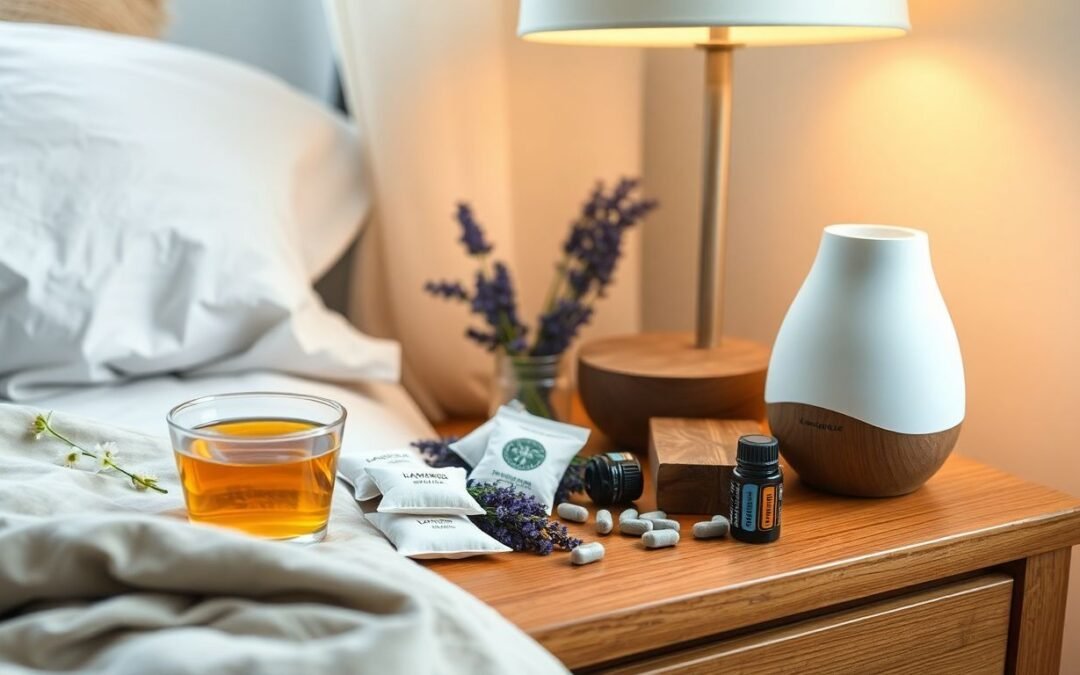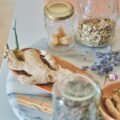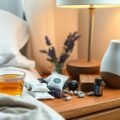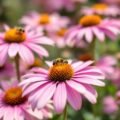Are you tossing and turning all night, desperate for just a few hours of solid sleep? Many of us know that frustrating feeling, staring at the ceiling while watching the clock tick past 3 AM.
After learning that over 35% of American adults get less than seven hours of sleep nightly, I started researching natural solutions. This guide will show you seven powerful herbs that can help calm your mind and relax your body for better sleep without harsh drugs.
The gentle remedies nature provides might be just what you need to finally get those peaceful zzz’s you’ve been dreaming about.
Key Takeaways
- Over 35% of American adults get less than seven hours of sleep nightly, creating a need for natural sleep solutions.
- Valerian root (400-900 mg before bed) increases GABA levels in the brain to improve sleep quality without causing dependency.
- Chamomile tea made from 2-4 grams of dried flowers contains apigenin that binds to brain receptors for better sleep.
- Lavender (20-80 mg daily) enhances sleep duration without morning grogginess through its calming essential oils.
- Herbal remedies like passionflower, lemon balm, ashwagandha, and hops offer gentler alternatives to prescription sleep medications with fewer side effects.
Listen to the full podcast about Herbal Remedies for sleep and insomnia below…
Exploring Herbal Remedies for Sleep and Insomnia
I’ve spent years studying plants that help people sleep better. Herbs offer a gentle path to rest that many find more appealing than synthetic options. The numbers tell an important story – 35.2% of U.S. adults get less than seven hours of sleep nightly, creating a real need for natural solutions.
Throughout history, cultures worldwide have turned to plants for sleep support. Today, this tradition continues with about 80% of the global population using herbal medicines for various health concerns.
This return to natural sleep aids makes perfect sense as we learn more about traditional herbal medicine.
Nature has provided us with a medicine cabinet of sleep-supporting herbs that have stood the test of time.
Companies have noticed this trend too. Products like ZzzQuil PURE Zzzs now include herbal ingredients, showing the growing demand for plant-based sleep support. In developing countries, the reliance on herbal remedies is even higher – reaching 95% of the population.
These natural sleep solutions often work through different pathways than prescription medications. They can improve sleep quality without the morning grogginess that comes with many sleep drugs.
The herbs I’ll discuss next have helped countless patients find their way back to restful nights.
Key Herbs for Natural Sleep Enhancement
Herbs hold powerful sleep-boosting properties that can transform your nights. Let me share my top seven herbal allies that have helped countless patients overcome sleepless nights without prescription medications.
Valerian Root Benefits
Valerian root stands as one of my top picks for natural sleep aids. This powerful herb has an impressive history dating back to ancient Greece and Rome where people used it for its calming effects.
I’ve seen great results with patients who take 400-900 mg about two hours before bedtime. The root grows mainly in Europe, North America, and Asia, making it widely available in various forms.
Many commercial products like ZzzQuil PURE Zzzs include about 300 mg per serving, though this falls on the lower end of the effective range.
Research shows valerian root can cut down the time it takes to fall asleep while boosting overall sleep quality. Most studies report no major side effects – only one study noted increased diarrhea in some users.
This makes valerian a safer option compared to prescription sleep medications that often cause morning grogginess or dependency. The herb works by increasing levels of GABA in your brain, the same neurotransmitter targeted by many prescription sleep drugs but without the harsh side effects.
Chamomile Properties
Chamomile stands as one of my favorite herbs for sleep support, backed by thousands of years of use across ancient civilizations like Egypt, Greece, and Rome. I’ve seen remarkable results when recommending this gentle yet powerful herb to my clients struggling with insomnia.
Clinical studies confirm what traditional healers have known for centuries – chamomile works! Research shows that 200 mg daily for 28 days improved sleep quality in elderly patients, while doses between 220-1100 mg daily for 8 weeks reduced anxiety symptoms.
For the best results, brew chamomile as an infusion using 2-4 grams of dried flowers in hot water. This creates a soothing tea with natural sedative properties that calm the nervous system without harsh side effects.
Many commercial products like ZzzQuil PURE Zzzs Melatonin Gummies include chamomile for its proven calming effects. The herb contains apigenin, a compound that binds to brain receptors to reduce stress and promote relaxation – making it perfect for those seeking natural alternatives to sleep medications.
Lavender Uses
While chamomile soothes with its gentle properties, lavender stands as another powerful herb in my sleep-support arsenal. I’ve seen remarkable results using lavender with my clients who struggle with insomnia.
This Mediterranean native contains essential oils that work wonders for improving sleep quality. Clinical trials confirm what I’ve observed in practice – lavender oil enhances both sleep duration and quality without causing drowsiness the next day.
For best results, 20 to 80 mg of lavender taken orally daily provides optimal benefits. My clients often report feeling more relaxed within just days of starting this regimen. The scent alone triggers a calming response in the brain, making it perfect for bedtime routines.
Lavender doesn’t just mask sleep problems – it addresses the root causes of restlessness by naturally calming the nervous system without morning grogginess.
Passionflower Effects
Moving from lavender’s calming scent, passionflower offers its own powerful sleep benefits. Native American Indians first discovered this plant’s relaxing properties centuries ago.
I’ve seen remarkable results with passionflower in my practice. The herb contains flavonoids that work on the brain’s GABA system – the same pathway that helps you feel calm and sleepy.
Products like ZzzQuil PURE Zzzs include 160 mg per serving because this dosage works well for most people.
Research shows passionflower extracts significantly boost total sleep time and improve slow-wave sleep – the deep, restorative phase your body needs. My patients report falling asleep faster without feeling groggy the next day.
The natural compounds in passionflower create a gentle sedative effect without the harsh side effects of prescription sleep aids. This makes it perfect for those who wake up throughout the night or struggle to stay asleep.
Lemon Balm Advantages
While passionflower calms the mind through its sedative properties, lemon balm offers its own special benefits for sleep. This herb has roots in sleep medicine dating back to the Middle Ages, making it a time-tested remedy for those seeking natural rest.
Lemon balm works as a GABA agonist in the brain, which helps reduce anxiety and promote relaxation naturally. I’ve found that patients who take the recommended dosage of 300 mg twice daily for about 15 days report significant improvements in their sleep quality.
The research shows impressive results beyond just sleep too – studies indicate that 1200 mg daily can improve premenstrual stress and tension. Many of my patients appreciate that this gentle herb provides relief without the harsh side effects often associated with prescription sleep medications.
Ashwagandha Contributions
Moving from lemon balm’s calming effects, I often suggest ashwagandha to my patients seeking deeper sleep solutions. This powerful herb, known as Indian ginseng in Ayurveda, works as an adaptogen to lower cortisol levels and reduce anxiety.
My patients report better sleep quality after taking the typical dose of 1-6 grams daily. The science backs this up – ashwagandha promotes non-REM sleep while easing stress that keeps many people awake.
You’ll find this sleep-boosting herb in products like ZzzQuil PURE Zzzs Sleep + De-Stress Gummies, making it easy to add to your bedtime routine. As a natural remedy, ashwagandha offers a gentler approach than many sleep medications.
The herb tackles insomnia from its root cause by helping your body manage stress rather than just forcing sleep. This makes it perfect for those nights when your mind races and won’t let you drift off.
Hops Features
Beyond ashwagandha’s calming effects, hops stands out as another powerful herb for sleep support. I’ve found hops particularly effective for patients who struggle with restlessness at night.
This plant grows mainly in Bavaria, China, the U.S., and Czech Republic, bringing its sleep-inducing benefits to people worldwide. My patients report good results with commercial products like ZzzQuil PURE Zzzs, which contains 60 mg of hops per serving.
For best results, try 0.5 g of dried hops as a tea before bed or take it as a dry extract. The bitter taste might surprise you at first, but many get used to it quickly. Early research backs up what I’ve seen in my practice – hops can help improve sleep quality without the morning grogginess of prescription medications.
This natural sleep aid works well paired with other herbs like valerian for those tough nights when your mind just won’t quiet down.
Advantages of Herbal Solutions for Sleep
Herbal solutions offer a gentle path to better sleep without the harsh side effects of prescription drugs. These natural remedies work with your body’s systems to promote relaxation and prepare your mind for restful slumber.
Natural Relaxation Techniques
I’ve found that natural relaxation methods work wonders alongside herbal sleep remedies. Deep breathing exercises calm your nervous system in just five minutes before bed. Your body responds to these simple practices by lowering stress hormones that keep you awake.
Many of my patients combine progressive muscle relaxation with herbs like valerian or hops to double their sleep benefits. This approach works because you’re addressing both physical and mental tension that cause insomnia.
Guided imagery and meditation create the perfect mental state for sleep without medication side effects. These techniques pair perfectly with herbal supplements like melatonin, which studies show can reduce the time needed to fall asleep.
The beauty of these methods lies in their simplicity – no special equipment needed, just a quiet space and a few minutes. Behavioral strategies like these boost the effectiveness of plant-based sleep aids while giving you tools to manage stress long-term.
Minimizing Medication Use
Many of my patients want to cut back on sleep medications due to side effects or dependency concerns. Herbs offer a gentler path to restful sleep without the morning grogginess that pills often cause.
I’ve seen folks switch from prescription sleep aids to a cup of chamomile tea with surprising success. Natural remedies typically have fewer side effects than pharmaceutical options, making them perfect for long-term use.
These plant-based sleep supplements can help you break the cycle of medication dependence gradually.
Herbal solutions work best as part of a complete approach to sleep health. Combining botanical sleep aids with good sleep habits creates a powerful strategy for insomnia relief. My practice focuses on these nonpharmaceutical sleep solutions because they support your body’s natural rhythms.
Please talk with your doctor before stopping any prescribed medications. Your healthcare provider should know about all herbs you try, as some can interact with medications you may be taking for other conditions.
Enhancing Sleep Quality
I’ve seen remarkable improvements in my patients who switch to herbal sleep aids. Better sleep means more than just feeling rested – it impacts your entire health picture. Research shows specific herbs actually change how your brain processes GABA, a calming chemical that helps you drift off.
My patients report falling asleep faster and waking less during the night after trying these natural options. For those with mild to moderate insomnia, these plant-based solutions often work without the morning grogginess that comes with prescription pills.
The right herbs don’t just knock you out – they support your body’s natural sleep cycle, helping you move through all sleep stages properly for true restoration.
Promoting Overall Health
Herbs offer more than just better sleep—they boost your whole body’s health. I’ve seen patients transform their wellness by adding simple herbal remedies to their daily routines.
These plants contain compounds that support immune function, reduce stress, and balance body systems naturally. For centuries, people across cultures have turned to herbs like valerian root and chamomile for their healing powers.
My patients report feeling more energetic during the day after using sleep herbs at night.
The connection between good sleep and health runs deep. Quality rest allows your body to repair cells, process memories, and reset hormone levels. Ashwagandha, an ancient Ayurvedic herb, stands out for its dual benefits of improving sleep while strengthening the body’s resilience to stress.
Many traditional herbal medicines work by addressing root causes rather than just masking symptoms. This holistic approach makes herbal solutions valuable tools for anyone seeking natural paths to better health.
Methods to Utilize Herbs for Improved Sleep
I’ll show you simple ways to use these powerful herbs in teas, oils, and supplements for a better night’s sleep – keep reading to discover how these natural remedies can fit into your bedtime routine!
Preparing Herbal Teas
Making sleep-friendly herbal teas at home is both simple and effective. For chamomile tea, I pour boiling water over 2-3 teaspoons of dried flowers and let it steep for about 10 minutes.
The gentle, apple-like scent fills my kitchen as the tea’s calming compounds release into the water. Valerian root requires just one teaspoon of dried herb in hot water, best consumed about an hour before bedtime to give its natural sedative effects time to work.
Lemon balm tea offers another great option for nighttime relaxation. One teaspoon of dried lemon balm leaves steeped in hot water creates a citrusy, minty brew that helps quiet a busy mind.
The key to getting the most benefit lies in giving these herbs enough steeping time – at least 5-7 minutes for the medicinal properties to fully extract. Now let’s explore how essential oils can complement these herbal tea remedies for even better sleep results.
Using Essential Oils
Beyond brewing herbal teas, essential oils offer another powerful way to harness plant benefits for sleep. I’ve found diffusing essential oils creates a peaceful bedroom environment that signals my brain it’s time to rest.
Lavender oil stands out as a top choice, with studies showing daily doses of 20 to 80 mg can improve sleep patterns and cut down anxiety levels. My favorite method involves adding 5-7 drops of lavender, chamomile, or lemon balm oil to a diffuser about 30 minutes before bedtime.
Essential oils work through aromatherapy, where calming scents travel directly to the brain’s emotional center. The process is simple yet effective. A small bottle of quality oil lasts for months, making this sleep aid both practical and affordable.
Direct inhalation works too – just place a drop on your pillow or add a few drops to a warm bath for deep relaxation. The natural compounds in these oils support your body’s own sleep rhythms without harsh chemicals or morning grogginess.
Opting for Supplements
I find herbal supplements offer a convenient option for people who don’t enjoy tea or essential oils. My clients often report great results with valerian root capsules at 250-600 mg or 400-900 mg extract forms before bedtime.
Chamomile supplements work well too, with standard doses of 300-400 mg in capsule or tincture form providing similar benefits to the tea version.
Ashwagandha has become my go-to recommendation for sleep issues tied to stress. The typical dose ranges from 300 to 600 mg daily, and many of my customers notice improvements within a few weeks of regular use.
Quality matters with supplements, so I always suggest buying from trusted brands that test their products for purity. Next, let’s explore the advantages of using these natural sleep solutions compared to conventional medications.
Conclusion
Herbs offer a gentle path to better sleep without harsh side effects. You can start with a simple cup of chamomile tea before bed or try a lavender essential oil diffuser in your bedroom.
These natural options work with your body’s systems rather than forcing sleep. Check with your doctor before adding any new herbs to your routine, especially if you take other medications.
Sweet dreams await when you use these sleep-boosting botanicals that have helped people rest for thousands of years.
FAQs
1. What are the best herbs for helping with sleep problems?
Several herbs stand out for sleep help. Valerian root tops the list as it helps you fall asleep faster. Chamomile tea calms nerves and eases you into rest. Lavender works through its scent to quiet your mind. Passionflower tackles racing thoughts that keep you up at night. Lemon balm reduces stress that blocks sleep. These plants have helped people doze off for centuries.
2. How do I use herbs for better sleep?
You can brew dried herbs into teas – steep them in hot water for 5-10 minutes. Some come as pills or liquid drops you take before bed. For lavender, try putting dried buds in a small pouch under your pillow or use the oil in a diffuser. Start with small amounts to see how your body reacts. Like dipping your toe in water before diving in, test herbs carefully.
3. Are natural sleep herbs safe to use every night?
Most sleep herbs are safe for short-term use, but they’re not magic bullets. Valerian and chamomile rarely cause problems when used correctly. Still, talk to your doctor first, especially if you take other medicines or have health issues. Some herbs might interact with drugs or affect certain conditions. The goal is finding what works without creating new troubles.
4. How long does it take for sleep herbs to work?
Don’t expect instant results like flipping a light switch. Some herbs like valerian may need 2-3 weeks of regular use before you notice big changes. Others like chamomile might help you relax the first time you try them. Your body chemistry plays a role too – what works for your friend might work differently for you. Stick with it and keep track of what happens. The path to better sleep sometimes winds a bit before reaching its destination.













